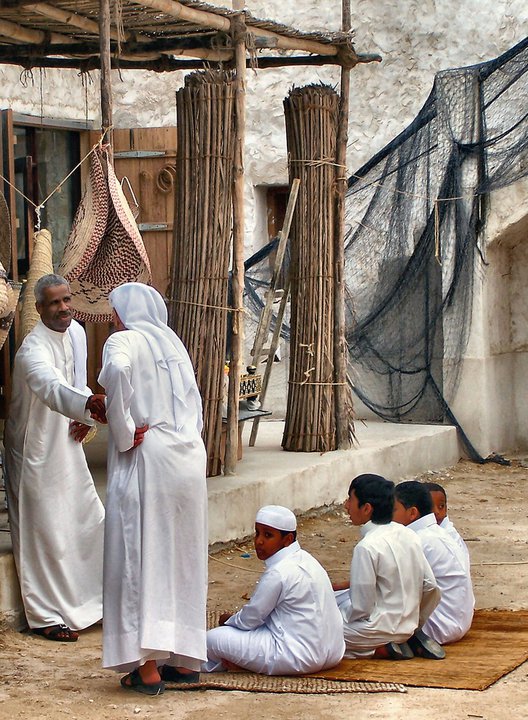
There are some sunnah on meeting people, such as ‘Give Salutation’, ‘Lengthen Greeting’, ‘Smiling’, ‘Shaking Hands’, & ‘Saying Kalimah Tayyibah’. How many times we meet people in a day? Imagine the rewards we will get by applying these! MashaAllah !!!
Sunnahs when Meeting People:
1. Give Tasleem (Salutation)
The Prophet (sallallahu ‘alaihi wa sallam) was asked “which type of Islam is the best?” ; and he (sallallahu ‘alaihi wa sallam) answered: “to feed people and salute the people you know or don’t know.” [Al-Bukhari, The Book of Eeman, Hadith 12; Muslim, The Book of Eeman, Hadith 39]
2. Lengthen the greeting
A man approached the Prophet (sallallahu ‘alaihi wa sallam) and saluted him saying “As-salaamu Alaykum (peace upon you)”, the Prophet (sallallahu ‘alaihi wa sallam) returned the salutation and after the man sat down, the Prophet said: “that was ten”; then another man came and said “As-salaamu Alaykum wa rahmatullah (peace and mercy of Allah upon you)” the Prophet (sallallahu ‘alaihi wa sallam) said: “that was twenty”; then a third man came and said ” As-salaamu Alaykum wa rahmatullaahi wa barakaatuh (peace and mercy and blessings of Allah upon you) the Prophet (sallallahu ‘alaihi wa sallam) said: “that was thirty.” [Abu Daawood, The Book of Good Manners; Muslim, The Book of Eeman, Hadith 5195, 2689; At-Tirmidhee, The Book of Asking Permission and Good Manners]
Look how much reward the first two wasted because they didn’t say the whole Islamic salutation to get the complete reward of thirty good deeds. And as a good deed it is at least considered ten; the sum would have been three hundred good deeds and might be more. As salutation take place many times a day; you should train yourself to utter the full Islamic salutation to get that great reward.
Do not forget that it is also from the Sunnah that whoever decides to leave a person that he should say the complete salaam:
“When one of you comes to a gathering, then say ‘Salaam’, and if someone decides to leave, then say ‘Salaam’, and the first does not have more right than the last.” [Abu Daawood, The Book of Good Manners; Muslim, The Book of Eeman, Hadith 5208, 2706; At-Tirmidhee, The Book of Asking Permission and Good Manners]
3. Smiling
The Prophet (sallallahu ‘alaihi wa sallam) said: “do not consider any of the good things as insignificant; even if it is that you meet your brother with a cheerful face.” [Muslim, The Book Piety, Joining of The Ties of Relationship and Good Manners, Muslim, The Book of Eeman, Hadith 2626]
4. Shaking hands
Our Prophet (sallallahu ‘alaihi wa sallam) said: “there are not two Muslims who meet with each other and shake hands of each other, except that they are forgiven them before their depart (from each other).” [Abu Daawood, The Book of Good Manners; Muslim, The Book of Eeman, Hadith 5212, 2727; At-Tirmidhee, The Book of Asking Permission and Good Manners]
An Nawawi said: you should know that it is preferred to shake hands in every time they meet. So dears, try to shake hands with whoever you salute with a smiley face; thus you will be applying three sunnahs at once.
5. Say kalimah Tayyibah
Allah says: “Say to My Slaves to say that which is better. Verily, Shaytaan incites to evil between them. Verily, Shaytaan is for mankind a clear enemy.” (Surah Al Isra’ 17: 53)
The Prophet (sallallahu ‘alaihi wa sallam) said: “A Kalimah Tayyibah is charity” [Al-Bukhari, The Book of Jihaad, Hadith 2989; Muslim, The Book of Az-Zakaah, Hadith 1009]
A Kalimah Tayyibah (Kind words) include: Ath-dhikr (remembrance of Allah), du’aa, salutation, rightful complementation, good manners, virtues and good deeds.
Kind words are magical as they win others’ hearts.
Kind words are proofs how enlightened the heart of the believer is. So you should embrace your whole life with kind words; your spouse, children, neighbors, friends, servants and everyone you deal with needs kind words.
 navedz.com a muslim's Quest for the truth
navedz.com a muslim's Quest for the truth








